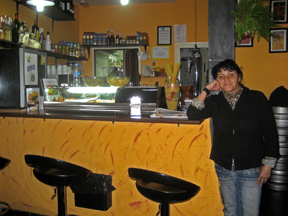Microcredit in Madrid
 ¡Hola, buenos días! My name is Martha, but here in España I am better known as “Marta” or even “Martita.” I am a junior in the Foster School of Business, focusing on Finance and CISB. I chose International Business because of my passion for traveling and learning about other cultures, and this opportunity with EUSA has been opening so many doors for me to explore career options. This internship introduced me to microcredit, which thus has become my newfound passion in life.
¡Hola, buenos días! My name is Martha, but here in España I am better known as “Marta” or even “Martita.” I am a junior in the Foster School of Business, focusing on Finance and CISB. I chose International Business because of my passion for traveling and learning about other cultures, and this opportunity with EUSA has been opening so many doors for me to explore career options. This internship introduced me to microcredit, which thus has become my newfound passion in life.
The concept of microcredit (giving small loans for business to those unable to access such credit) began in Bangladesh, but now has been spreading and adapting to countries all around the world. Here in Madrid, I work for a non-profit organization called MITA, which is a center for entrepreneurial development especially for immigrants and women. Spain has a huge population of immigrants, many of which bring diverse ideas and products with business potential. Understandably, it is quite difficult for a low-income immigrant to obtain a €25,000 loan and successfully open a business with limited analysis of the Spanish market, business laws and regulations, and limited experience with creating a business plan. Clients come to MITA for training, advising, and assistance in securing a special low-interest loan from one of several banks in Madrid that offer microcredit services.
Only a handful of dedicated workers make up the organization of MITA, curiously, all women. It is a fun atmosphere to work in, light-hearted and casual. There is always plenty of work to do; this small organization is steady with clients. My colleagues, Leticia and Elena, have each about 10-15 ongoing projects with their entrepreneurs-in-training. Currently, most of my work involves researching and compiling reports about market sectors to help determine if a certain type of business would be viable here in Madrid. I find market studies from internet databases, news articles, magazines, and browse through information in past business plans. Most of the business ideas are restaurants, bars, grocery stores, hair salons, and bakeries, but occasionally something unusual comes along, like a fruit pulp importing business.
It is interesting that so many small businesses can stay profitable, because they are extremely abundant. I can count at least four small traditional grocery stores, two large supermarkets, three bakeries, a fruit store, a meat store, a candy store, a tobacco store, and many restaurants/bars within just minutes of walking from my apartment! I will not even start counting the retail stores. It also seems curious that such a large proportion of storekeepers are immigrants. For many immigrants, owning their own business is often a way of survival if the government only permits them residency without the ability to work for others.
 Last week, our director sent me to visit a client for a follow-up interview about her new business. I met María Da Silva, a 40 year-old woman from Brazil, at her tiny 6-table restaurant called Rincón Bahaino. The traditional Brazilian foods she offers have brought in some steady business since her opening, and she is satisfied with owning her restaurant. She told me she loves working with her family and feeling independent, and that the microloan MITA helped secure was a huge help for the success of her business.
Last week, our director sent me to visit a client for a follow-up interview about her new business. I met María Da Silva, a 40 year-old woman from Brazil, at her tiny 6-table restaurant called Rincón Bahaino. The traditional Brazilian foods she offers have brought in some steady business since her opening, and she is satisfied with owning her restaurant. She told me she loves working with her family and feeling independent, and that the microloan MITA helped secure was a huge help for the success of her business.
It feels great to be part of a something that is still catching on in the world. Giving loans to people who are not credit-worthy may initially seem like a backwards idea, but microcredit has been successful and is continually proving its value by improving peoples’ lives.
